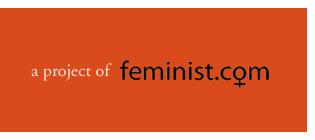 |
 |
Can you
be a feminist and religious?
Amilynn Asks: I do however have a question that has prevented me from moving forward with a feminist mentality. I have been raised in a very loving Christian home. My parents have instilled in me since birth a very strong sense of morals and belief in God and Jesus Christ. My issue is that Christianity is a very Paternalistic religion, and emphasizes the power of the male gender. In the bible it states that men are to be spiritual leaders over women, and that women should submit to their husbands. Also God is obviously portrayed as being a male, and no females have made as great of an impact as any male has in the bible. For example, the story of Adam and Eve clearly states that Eve was the wicked woman that tempted her husband into sin. I know it may have to do with the time period that the bible was written during, but many influential verses deal with statements such as "every man on earth...Sons of God...etc." Was this done on purpose to exclude women? Are women supposed to be the silent followers alongside their husbands? Is that what God has intended for me? I do not want to submit to any man. I want to live my life to fulfill my passions and goals, and not to have to compromise any of that for men. But I also do not want to have to choose between my beliefs and feminism. Is there a way I can incorporate one into another? The bible also preaches that women's rights such as abortion are clearly wrong. I do not know how to deal with the clashing of two belief systems. If you have any advice for me in this area that would be fantastic. Thanks so much for your time! — Amilynn Our Inner Lives team members Amy Richards & Meggan Watterson answers: Amy Richards answers... In terms of religion and feminism -- historically
(late 60s and early 70s) I think it was hard for many feminists
to stay connected to their organized religions because they felt
exclusive and shut off to women. Then women felt that they weren't
being true to themselves by not staying connected to their religions
and thus there came a surge of feminist theologians who helped
reclaim women from some of these religions -- and realized that
often it wasn't the actual religion that was sexist, but the limited
interpretations thus they began offering more feminist infused
interpretations. Today I think it's absolutely possible to be a
feminist and be religious -- I just think it takes some maneuvering
-- finding the right leaders and the right venue. I think they
exist, but it might take some work to find the right place for
you. You might start by using the resources of Auburn Theological
Seminary, based in New York City, -- even Union Theological Seminary
based in New York. Also, some academic institutions -- namely Harvard
and Princeton have renowned theological departments that are producing
some new discourse on religion. I also particularly love the work
of Karen Armstrong. I hope that helps to point you in another
direction. And the short answer is yes, you can certainly be a
feminist and also connected to your religions.
I know ministers who use scripture like the two verses I've included in this response to suggest that the divine wants love equally for all of us and that love in action is justice. These verses suggest that the divine would want any power structures that unjustly create suffering for women to end. (For example, if there is no "male and female" in Christ then why would the divine want only men to speak on the divine's behalf?) I am the executive director and co-founder of REVEAL: Young Women Defining the Divine, an interfaith non-profit to provide a platform for young female spiritual leaders and a spiritual home for young women to claim and name their spiritual experience of the divine. REVEAL's website is http://www.revealconference.org. There are several books I can suggest for helping you in your journey to reconcile your faith and feminism. At the top of the list would be Dr. Helen Lakelly Hunt's "Faith and Feminism: A Holy Alliance." This is a tremendous contribution to what I consider to be the 4th wave of feminism, which is the wave you're contending with- where feminism and faith are coming together to create a spiritually-infused form of feminism. In it you'll find several examples of powerful women of faith who felt called to address women's inequity because of their spiritual connection to the divine. Another book is by Carol Lee Flinders, an advisory board member for REVEAL, titled "At The Root Of This Longing: Reconciling a Feminist Hunger And a Spiritual Thirst." Finally, there's a new anthology edited by two young Catholic women titled, "From The Pews In The Back." Karen King has a very powerful book about Mary
Magdalene that may influence your view of who she was and what
role she was meant to play in Christian history. It's called "The
Gospel Of Mary of Magdala." (Yes, Mary Magdalene had her own
gospel!) I adore this book and have practically memorized it. It
reminds me that we, as women, have never been able to tell our
own version of the story- our own experience of the divine has
not been recorded or represented. We still have much work to do
to bring women's unique appreciation, understanding, and experience
of the divine to light. I send you so many blessings on your spiritual
journey. Email us your queries.
|
|||
Home | About Us | Features | Ask
Our Team | Inspiration
& Practice | Women of Vision | Resources
Copyright 2010 Feminist.com. All rights reserved.